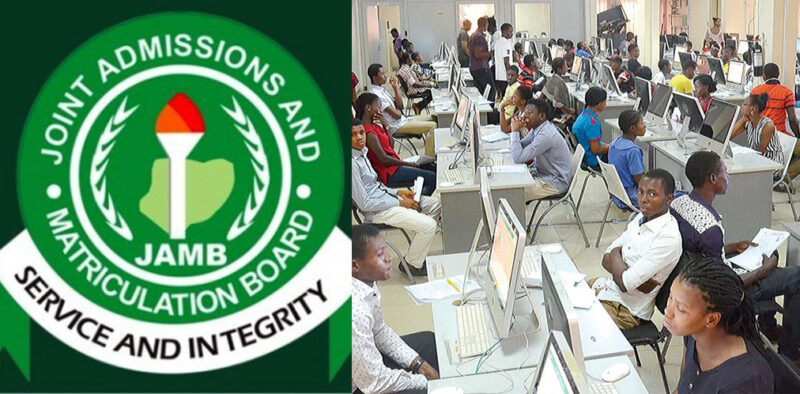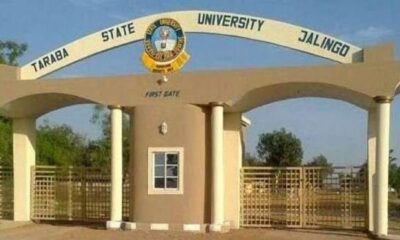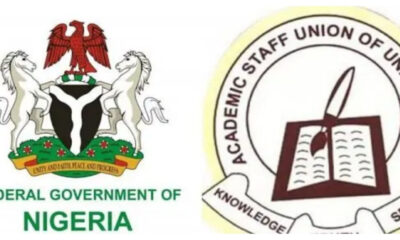Education
JUST IN: ASUU rejects curriculum prepared by NUC for universities

JUST IN: ASUU rejects curriculum prepared by NUC for universities
The Academic Staff Union of Universities has rejected the Core Curriculum Minimum Academic Standards prepared by the National Universities Commission.
The union said it was nightmarish, a threat to quality university education, and an erosion of powers of the university Senate in Nigerian universities.
A statement signed by the national president of ASUU, Prof. Emmanuel Osodeke, on Friday, explained that it was inexplicable that NUC pre-packaged 70 per cent CCMAS contents were being imposed on the Nigerian University System, adding that university Senates, who are statutorily responsible for academic programme development, were left to work on only 30 per cent.
It stressed that there were growing concerns about the numerous shortcomings and gross inadequacies of the CCMAS documents.
READ ALSO:
- Mercedes recalls over 140,000 cars in U.S. over fuel pump defect
- Special Forces reject N5m bribe from rail track vandals in Nasarawa
- Gov Mohammed splashes foreign currency on 3,000 Bauchi pilgrims
“ASUU is not unaware that setting academic standards and assuring quality in the NUS is within the remit of the NUC. Section 10(1) of the Education (National Minimum Standards and Establishment of Institutions) Act, Cap E3, Laws of the Federation of Nigeria 2004, enjoins the NUC to lay down the minimum standards for all universities and other degree awarding institutions in the Federation and conduct the accreditation of their degrees and other academic awards.
“However, the process of generating the standard is as important (if not more important) than what is produced as “minimum standards”.
“In this instance, the NUC has recently, through some hazy procedures, churned out CCMAS documents containing 70% curricular contents in 17 academic fields with little or no input from the universities. The academic disciplines covered are (i) Administration and Management, (ii) Agriculture, (iii) Allied Health Sciences, (iv) Architecture, (v) Arts, (vi) Basic Medical Sciences, (vii) Computing, (viii) Communication and Media Studies, (ix) Education, (x) Engineering and Technology, (xi) Environmental Sciences, (xii) Law, (xiii) Medicine and Dentistry, (xiv) Pharmaceutical Science, (xv) Sciences, (xvi) Social Sciences, and (xvii) Veterinary Medicine,” it read partly.
It stressed that many university administrators, though dissatisfied, were shying away from making public comments on CCMAS.
READ ALSO:
- Subsidy Removal: Governor Adeleke hints on palliatives
- VIDEO: Apostle Chibuzor, OPM General Overseer collapses at the airport
- Bayern Munich turn to Osimhen, put Kane talks on hold
The statement revealed that, however, some university Senates did not hide their displeasure with the ongoing efforts to impose CCMAS on Nigerian universities by the NUC.
It read, “The CCMAS is a nightmarish model of curriculum reengineering. It is an aberration to the Nigerian University System. The CCMAS documents are flawed both in process and in content. There is no basis for the 70% “untouchable CCMAS,” which cannot stand the test of critical scrutiny of university Senates.”
However, it suggested that “NUC should encourage universities, as currently being done by the University of Ibadan, to propose innovations for the review of their programmes. Proposals from across universities should then be sieved and synthesised by more competent expert teams to review the existing BMAS documents and/or create new ones as appropriate.
“The difference here is the bottom-up approach, unlike the top-bottom or take-it-or-leave-it model of the CCMAS.”
JUST IN: ASUU rejects curriculum prepared by NUC for universities
Education
Ogun Gov Rewards Nigeria’s Best Primary School Teacher with Car, Bungalow

Ogun Gov Rewards Nigeria’s Best Primary School Teacher with Car, Bungalow

Ogun Gov Rewards Nigeria’s Best Primary School Teacher Solanke Francis Taiwo with Car and Bungalow
The Ogun State Governor, Dapo Abiodun, has honoured Mr Solanke Francis Taiwo, a primary school teacher at Ansa‑Ur‑Deen Main School I, Kemta Lawa, Abeokuta, with a brand new car and a two‑bedroom bungalow in recognition of his achievement as Nigeria’s Overall Best Primary School Teacher for the 2025/2026 academic year.
The presentation took place at the Governor’s Office in Oke‑Mosan, Abeokuta, with the Commissioner for Education, Science and Technology, Prof Abayomi Arigbagbu, and the ministry’s Permanent Secretary, Mr Oloko, in attendance. The gifts were part of a broader effort to motivate teachers, reward professional excellence, and highlight the state’s education reforms.
Speaking at the event, Prof Arigbagbu said the award demonstrates the effectiveness of the Ogun State Education Revitalisation Agenda, which is built on six pillars including curriculum enhancement, school administration, innovation, infrastructure, funding, and teachers’ welfare. “When you do things consistently and efficiently, you record results. This same teacher won the Ogun State Best Teacher Award in October before clinching the national award in Abuja. This confirms that our education sector has been truly revitalised,” he said.
READ ALSO:
- Police Bust Gang Armoury, Arrest Two Suspects in Delta
- Peter Obi Launches ‘Village Boys Movement’ to Rival Tinubu’s City Boys Ahead of 2027
- Woman Dies in Bandits’ Camp After Family Pays ₦25 Million Ransom

Ogun Gov Rewards Nigeria’s Best Primary School Teacher Solanke Francis Taiwo with Car and Bungalow
He highlighted the state’s successes in national competitions, including the JETS contests, where Ogun students won 18 out of 24 awards in one year, with a single student claiming nine prizes. The commissioner also noted that Ogun’s Technical and Vocational Education and Training (TVET) model and education digitisation initiatives have attracted attention from other states and received commendation from the Federal Government and the National Board for Technical Education.
Governor Abiodun reaffirmed his commitment to teacher development, pledging continuous support through workshops, seminars, digital learning platforms, and AI-powered instructional tools. He said the gifts of a car and bungalow are intended to inspire other educators to strive for excellence and innovation in their teaching.
In his remarks, Mr Solanke expressed gratitude to the governor and the education ministry for fostering an enabling environment for teaching and learning. He vowed to continue improving student learning outcomes and collaborating with colleagues to ensure that Ogun State remains a leader in education excellence.
“I feel fulfilled and honoured. I will continue to give my best and encourage fellow teachers to remain dedicated to nurturing the potential of every student,” he said.
The recognition of Mr Solanke reflects Ogun State’s strategic investment in education, commitment to teacher welfare, and the effectiveness of policies that have positioned the state as a model for academic excellence in Nigeria.
Ogun Gov Rewards Nigeria’s Best Primary School Teacher with Car, Bungalow
Education
Over 1.5 Million Candidates Registered as JAMB UTME Pin Vending Nears Deadline

Over 1.5 Million Candidates Registered as JAMB UTME Pin Vending Nears Deadline
The Joint Admissions and Matriculation Board (JAMB) has confirmed that more than 1.5 million candidates have registered for the 2026 Unified Tertiary Matriculation Examination (UTME), as the deadline for e‑PIN vending and registration rapidly approaches.
In a statement released in Abuja by the board’s Public Communication Advisor, Dr. Fabian Benjamin, the board said the sale of e‑PINs — required for candidates to proceed with registration at accredited centers — will close at midnight on Thursday, February 26, 2026, while actual registration at centres will end on Saturday, February 28, 2026.
According to JAMB, its daily registration capacity stands at 100,000 candidates, but most centres are currently operating at roughly 30 per cent capacity, indicating that a significant number of eligible candidates have yet to register. The board emphasised that there will be no extension of the registration window, explaining that the schedule aligns with the national examination calendar and is coordinated to allow other examination bodies to conduct their exercises without conflict.
READ ALSO:
- FG Seals Plateau Mine After 37 Killed in Toxic Gas Tragedy
- Troops Kill Five Kidnappers, Rescue Abducted Woman in Plateau
- Sowore Condemns Electoral Act 2026 as Threat to Nigeria’s Democracy
JAMB urged candidates to secure their e‑PINs early and complete registration at accredited CBT centres without delay. The board warned that last-minute registration could result in avoidable challenges and reiterated that it will not entertain appeals for deadline extensions.
The 2026 UTME is scheduled to hold from April 16 to April 25 and will determine admission into universities, polytechnics, and colleges of education across Nigeria. JAMB also assured candidates that all testing centres would have adequate security, technical support, and invigilation to ensure a smooth and credible examination process.
Education experts and stakeholders have encouraged candidates to register promptly and take advantage of preparatory resources offered online and at local centres. State education authorities have also organised orientation programmes to guide students through registration, examination, and post-UTME procedures.
JAMB continues to provide updates and guidance through its official portal and social media channels, ensuring that candidates have access to information about registration, examination procedures, and exam day requirements.
Over 1.5 Million Candidates Registered as JAMB UTME Pin Vending Nears Deadline
Education
BREAKING: Academic Activities Halted as ASUU Resumes Strike

BREAKING: Academic Activities Halted as ASUU Resumes Strike
The Academic Staff Union of Universities (ASUU), Taraba State University (TSU) branch, has resumed an indefinite strike, citing the failure of the Taraba State Government to honour agreements reached earlier with the union.
The industrial action comes weeks after ASUU suspended its earlier strike following negotiations held on January 17, 2025, a move the union said was done in good faith to allow the government time to meet its commitments. According to ASUU, those promises were not fulfilled, forcing lecturers to withdraw their services again.
In a statement issued in Jalingo, the ASUU TSU branch chairman, Joshua Garba Mbave, said the government failed to take practical and verifiable steps toward resolving the lingering issues affecting staff welfare.
READ ALSO:
- Ramadan Health Tips: Six Ways to Stay Hydrated While Fasting
- Tinubu Urges Senate to Confirm Yusuf for NAHCON, Marafa for INEC
- Galatasaray Stun Juventus 5–2 in UEFA Champions League
The union said its congress meeting held on February 18, 2026, reviewed developments since the suspension of the strike and unanimously agreed to resume the total, comprehensive, and indefinite strike.
ASUU listed several unresolved demands, including unpaid salary arrears, non-payment of Earned Academic Allowances, the absence of a functional pension scheme for university workers, and the failure to implement the 2025 ASUU–Federal Government agreement applicable to state-owned universities.
Dr. Mbave warned that the continued neglect of these issues has crippled staff morale, worsened economic hardship for lecturers, and disrupted academic stability at Taraba State University. He stressed that sustained dialogue with the Taraba State Government had produced no concrete outcome.
As a result of the renewed strike, academic activities at Taraba State University have been suspended indefinitely, with students advised to remain at home until further notice.
BREAKING: Academic Activities Halted as ASUU Resumes Strike
-

 International2 days ago
International2 days agoCanada Opens New Express Entry Draw for Nigerian Workers, Others
-

 Politics21 hours ago
Politics21 hours agoPeter Obi Launches ‘Village Boys Movement’ to Rival Tinubu’s City Boys Ahead of 2027
-

 News3 days ago
News3 days agoKorope Drivers Shut Down Lekki–Epe Expressway Over Lagos Ban (Video)
-

 News1 day ago
News1 day agoPolice to Arrest TikToker Mirabel After She Recants False Rape Claim
-

 Health3 days ago
Health3 days agoRamadan Health Tips: Six Ways to Stay Hydrated While Fasting
-

 Entertainment3 days ago
Entertainment3 days agoActress Destiny Etiko Breaks Silence on Alleged Nollywood Betrayal
-

 International1 day ago
International1 day agoEpstein, Ex-Israeli PM Named in Alleged Profiteering From Boko Haram Crisis
-

 metro2 days ago
metro2 days agoOsun Awards 55.6km Iwo–Osogbo–Ibadan Road Project to Three Contractors













